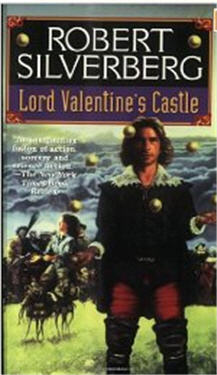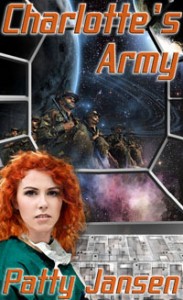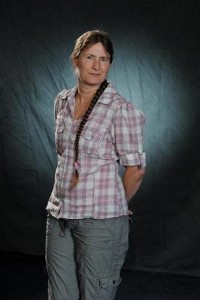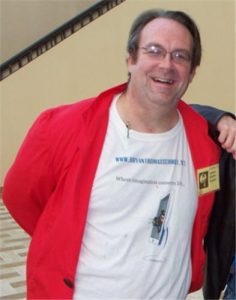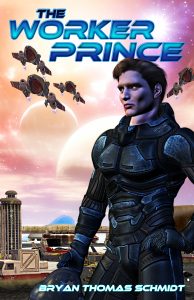I read a lot of books for my author interviews on SFFWRTCHT and blogs like GraspingForTheWind.com, www.SFSignal.com, and Ray Gun Revival, as well as my own blog. In fact, reading for those dominates my reading time. I rarely squeeze in books for fun or learning anymore. Most of the time, I’m excited to read the books because I love discovering new authors and for years I didn’t read speculative fiction at all, so I am way behind in my genre knowledge. But every once in a while you come across one that makes you think “I probably won’t enjoy this” for various reasons. Isn’t it wonderful to instead discover you adore them? Here’s Eleven series I had that initial reaction to which are now among my favorites:
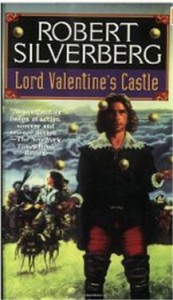
1) The Majipoor Books by Robert Silverberg–WHAT?! You say? Well, I’d never heard of Robert Silverberg when my twin sister gave me Lord Valentine’s Castle for Christmas at age 15. It was not a book on my Christmas list, and, frankly, I was annoyed that she would dare deviate from my carefully prepared list. The cover intrigued me though with its aliens juggling and such. And boy, this book knocked my socks off. Other than The Hobbit (I had yet to read Lord Of The Rings), this book had the most amazing world building I had ever seen. It absolutely knocked me out. And I adored it. I snagged Majipoor Chronicles as soon as that came out, and the alien sex scenes certainly stimulated my young teenage boy mind (HEY! I’m only human people!) It took years for me to get the rest and read them, but I finally did and reread the first two as well. My favorite novel series of all time, hands down. Amazing characters, amazing world building, masterful storytelling in every sense. True classics. Not to be missed. His second series surrounding Presimion is maybe even better than the first, but Lord Valentine’s Castle remains my favorite. They are all getting released starting this month by ACE/ROC Books, too.
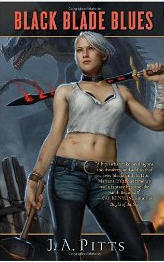 2) Black Blade Blues by John A. Pitts–An urban fantasy with dragons and a Lesbian heroine with romance. Dragons are overdone. They’ve been done a million times. And I’m straight, not gay. To each his or her own, but when I do read romance, I just prefer male on female. Also, this just sounded like a teen set, girly appeal book to me. Not because John himself is all that girly. He’s really not. In fact, he’s become a good friend. But this was one I expected to not enjoy and instead turned out to be one of my favorite series ever. Pitts writes really good characters and action. He also does some unique POV things, with all Sarah Buehall’s chapters in 1st person, and 3rd person for the supporting POV characters. He takes old tropes like dragons and the blacksmith and breathes new life into them. He also takes modern SCA reenactors and throws them into their living fantasy and mines it for humor skillfully. Just a delight in every way and should not be missed. SERIOUSLY. Straight guys too!
2) Black Blade Blues by John A. Pitts–An urban fantasy with dragons and a Lesbian heroine with romance. Dragons are overdone. They’ve been done a million times. And I’m straight, not gay. To each his or her own, but when I do read romance, I just prefer male on female. Also, this just sounded like a teen set, girly appeal book to me. Not because John himself is all that girly. He’s really not. In fact, he’s become a good friend. But this was one I expected to not enjoy and instead turned out to be one of my favorite series ever. Pitts writes really good characters and action. He also does some unique POV things, with all Sarah Buehall’s chapters in 1st person, and 3rd person for the supporting POV characters. He takes old tropes like dragons and the blacksmith and breathes new life into them. He also takes modern SCA reenactors and throws them into their living fantasy and mines it for humor skillfully. Just a delight in every way and should not be missed. SERIOUSLY. Straight guys too!
 3) Greywalker by Kat Richardson–I read this after meeting Kat at Rainforest Writers. She was delightful. But urban fantasy had never sounded like much of anything I’d enjoy. Instead, I’m hooked. And I have Kat to blame. At first, it sounded too Sixth Sense-like for me. As one of the few people who didn’t care for that movie, this was not a draw. But man, I love this series. I’m hooked. I went out and tracked down copies of every one. I’ve since read another and interviewed her. And it inspired my own idea for an urban fantasy detective noir series I am working on. Love these books. They are even better than you’ve heard.
3) Greywalker by Kat Richardson–I read this after meeting Kat at Rainforest Writers. She was delightful. But urban fantasy had never sounded like much of anything I’d enjoy. Instead, I’m hooked. And I have Kat to blame. At first, it sounded too Sixth Sense-like for me. As one of the few people who didn’t care for that movie, this was not a draw. But man, I love this series. I’m hooked. I went out and tracked down copies of every one. I’ve since read another and interviewed her. And it inspired my own idea for an urban fantasy detective noir series I am working on. Love these books. They are even better than you’ve heard.
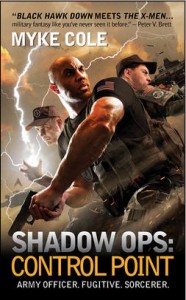 4) Shadow Ops: Control Point by Myke Cole–Military fantasy? Military anything really. Okay, I like John Ringo. And I am pro-military. But it just sounded odd, although I adore the book cover. I could not have been more wrong. I absolutely got my socks knocked off, and I still can’t find them. Cole is a master at world building and working old tropes inventively into the modern world. He also knows his military and it shows. It’s like an inside view of military life in so many ways, and I think it makes you respect all the more, the sacrifices our troops make in serving our country. Sure to make you patriotic in a good way but also challenges the idea that obeying orders strictly is an ideal rule of thumb. Cole infuses his characters with humanity, even the goblins, yes, and makes you care about them and root for them. Really fun and exciting possibilities with this one. And women, you’ll love it just as much. He writes good, strong females as well. I can’t wait to read the rest. And I am telling you, this one is for everyone!
4) Shadow Ops: Control Point by Myke Cole–Military fantasy? Military anything really. Okay, I like John Ringo. And I am pro-military. But it just sounded odd, although I adore the book cover. I could not have been more wrong. I absolutely got my socks knocked off, and I still can’t find them. Cole is a master at world building and working old tropes inventively into the modern world. He also knows his military and it shows. It’s like an inside view of military life in so many ways, and I think it makes you respect all the more, the sacrifices our troops make in serving our country. Sure to make you patriotic in a good way but also challenges the idea that obeying orders strictly is an ideal rule of thumb. Cole infuses his characters with humanity, even the goblins, yes, and makes you care about them and root for them. Really fun and exciting possibilities with this one. And women, you’ll love it just as much. He writes good, strong females as well. I can’t wait to read the rest. And I am telling you, this one is for everyone!
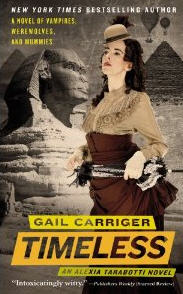 5) The Parasol Protectorate by Gail Carriger–Okay, parasol in the title. Pretty much said it all. Romance. Also, vampires and werewolfs AGAIN?????!!! Not my favorite. No one can top Anne Rice in the vampires, if you ask me, although Charlaine Harris is giving her a run for the money at the moment. I read it because Carriger is a leading steampunk author, a genre I love. And I’d heard good things. I am in love with this series, too. Went out and tracked them all down. Carriger is hilarious and she uses old tropes in new ways while making absolutely fantastic use (and fun) of her Victorian setting. She even gets the Old Queen herself involved. Yes, there’s romance, but not in a sappy, smarmy way. (Well, not too much.) Her lead character is not one of those sappy females with dreamy eyed looks and emotions at all. She’s a bit rougher around the edges, and, as such, a bit of an outcast. She also has gifts which set her apart. I won’t spoil it for you. But I adored the first book and can
5) The Parasol Protectorate by Gail Carriger–Okay, parasol in the title. Pretty much said it all. Romance. Also, vampires and werewolfs AGAIN?????!!! Not my favorite. No one can top Anne Rice in the vampires, if you ask me, although Charlaine Harris is giving her a run for the money at the moment. I read it because Carriger is a leading steampunk author, a genre I love. And I’d heard good things. I am in love with this series, too. Went out and tracked them all down. Carriger is hilarious and she uses old tropes in new ways while making absolutely fantastic use (and fun) of her Victorian setting. She even gets the Old Queen herself involved. Yes, there’s romance, but not in a sappy, smarmy way. (Well, not too much.) Her lead character is not one of those sappy females with dreamy eyed looks and emotions at all. She’s a bit rougher around the edges, and, as such, a bit of an outcast. She also has gifts which set her apart. I won’t spoil it for you. But I adored the first book and can
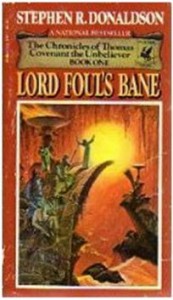 6) The First Chronicles Of Thomas Covenant by Stephen R. Donaldson–I picked these up because the Darrell Sweet covers were so intriguing and I wanted something fantasy to read. I had been reading a lot of science fiction but not as much fantasy. Then the main character was not so nice and he raped a young girl. I almost put it down right then. So glad I didn’t. The redemption journey of Thomas Covenant is so worth the effort and Donaldson is so masterful a writer. I am thrilled to have met him and had him sign my copy a couple of years ago. And we have an interview coming up for SFFWRTCHT with him where I focused on this series. He’s got two trilogies and a 4 book final cycle in this universe now, and they are rightly regarded as classics of the genre. Also, the later cycles have a female lead, so if you women are turned off by Covenant’s behavior, you really should still give this a chance. The world building is rich and unique and the journey is one that touches the heart. I promise.
6) The First Chronicles Of Thomas Covenant by Stephen R. Donaldson–I picked these up because the Darrell Sweet covers were so intriguing and I wanted something fantasy to read. I had been reading a lot of science fiction but not as much fantasy. Then the main character was not so nice and he raped a young girl. I almost put it down right then. So glad I didn’t. The redemption journey of Thomas Covenant is so worth the effort and Donaldson is so masterful a writer. I am thrilled to have met him and had him sign my copy a couple of years ago. And we have an interview coming up for SFFWRTCHT with him where I focused on this series. He’s got two trilogies and a 4 book final cycle in this universe now, and they are rightly regarded as classics of the genre. Also, the later cycles have a female lead, so if you women are turned off by Covenant’s behavior, you really should still give this a chance. The world building is rich and unique and the journey is one that touches the heart. I promise.
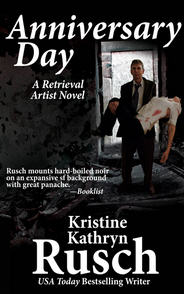 7) The Retrieval Artist series by Kristine Kathryn Rusch–I read these because I had read her first Diving book and several great short stories, but the idea of a noir detective in science fiction didn’t sound like my thing. I have never been a huge mystery reader. I think Rusch changed all that with these books. I adore this series and her mix of genres. She also does some really fantastic world building in here as well. Her use of tropes in new ways, her alien species, etc. are so well thought out, with real cross cultural conflicts and consequences arising from their different world views. Authors don’t always think it through that far or even strive to incorporate it all, and she’s challenged me as a writer to go further as a result. Highly recommended. Kris has become a friend and one of my favorite authors.
7) The Retrieval Artist series by Kristine Kathryn Rusch–I read these because I had read her first Diving book and several great short stories, but the idea of a noir detective in science fiction didn’t sound like my thing. I have never been a huge mystery reader. I think Rusch changed all that with these books. I adore this series and her mix of genres. She also does some really fantastic world building in here as well. Her use of tropes in new ways, her alien species, etc. are so well thought out, with real cross cultural conflicts and consequences arising from their different world views. Authors don’t always think it through that far or even strive to incorporate it all, and she’s challenged me as a writer to go further as a result. Highly recommended. Kris has become a friend and one of my favorite authors.
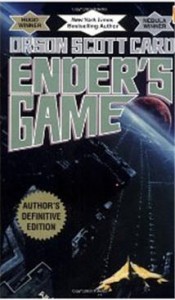 8 ) The Ender Series by Orson Scott Card–This one I had hesitancy for silly reasons. I wasn’t reading science fiction at the time and I’d only heard bad things about this author’s strong opinions. But my cousin David and his wife insisted I’d love these. They even gave me their copies, so I felt obligated to give them a chance. After all, David and I have always been close and our mutual love of speculative fiction is one reason. David introduced me to D&D, Star Wars and so many things. He was right. Ender’s Game is called a classic with good reason. No matter what you think of Card’s religion or opinions on politics, he’s masterful at writing and those themes don’t come into it with this series (at least so far). This is really good militarySF and space opera. And not to be missed by genre fans.
8 ) The Ender Series by Orson Scott Card–This one I had hesitancy for silly reasons. I wasn’t reading science fiction at the time and I’d only heard bad things about this author’s strong opinions. But my cousin David and his wife insisted I’d love these. They even gave me their copies, so I felt obligated to give them a chance. After all, David and I have always been close and our mutual love of speculative fiction is one reason. David introduced me to D&D, Star Wars and so many things. He was right. Ender’s Game is called a classic with good reason. No matter what you think of Card’s religion or opinions on politics, he’s masterful at writing and those themes don’t come into it with this series (at least so far). This is really good militarySF and space opera. And not to be missed by genre fans.
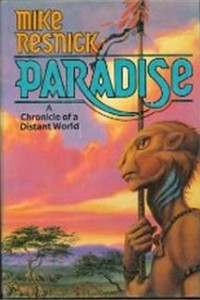 9) The Chronicles Of A Distant World series by Mike Resnick–I am now a huge Resnick fan and he’s become a friend and mentor. He even blurbed my forthcoming novel and wrote a story for an anthology I edited. But full disclosure aside, I read this when I really had no idea who this Resnick guy was. I just knew he’d won a lot of awards and was a big shot amongst writers (everyone said). He also had a passion for Africa and so do I. But could a white guy from Ohio really do the African cultures I adored justice? I think he did splendidly, frankly. This series of science fiction inspired by African history and imagining what the future might look like has been a touchstone for me. In fact, the predictions Resnick made came true in some cases. Very unique and not like most other SF you will read but that’s all the more reason you shouldn’t miss it. Masterfully done and really deep world building and cross cultural explanation. No preaching. No judging. He just lays it out there like the expert he is and lets readers to the rest.
9) The Chronicles Of A Distant World series by Mike Resnick–I am now a huge Resnick fan and he’s become a friend and mentor. He even blurbed my forthcoming novel and wrote a story for an anthology I edited. But full disclosure aside, I read this when I really had no idea who this Resnick guy was. I just knew he’d won a lot of awards and was a big shot amongst writers (everyone said). He also had a passion for Africa and so do I. But could a white guy from Ohio really do the African cultures I adored justice? I think he did splendidly, frankly. This series of science fiction inspired by African history and imagining what the future might look like has been a touchstone for me. In fact, the predictions Resnick made came true in some cases. Very unique and not like most other SF you will read but that’s all the more reason you shouldn’t miss it. Masterfully done and really deep world building and cross cultural explanation. No preaching. No judging. He just lays it out there like the expert he is and lets readers to the rest.
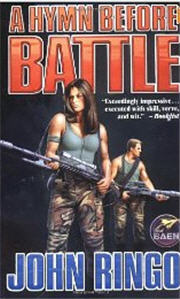 10) The Posleen War Series by John Ringo–I am not a big military story reader. I support the military. But reading military books is rare. I love political intrigue like old school Tom Clancy and WEB Griffin, but the idea of war books didn’t appeal. But people kept raving about MilitarySF. And people said John Ringo was a great place to start. Plus I heard an interview with the author that impressed me. A Hymn Before Battle blew me away. I went out and bought the series and can’t wait to tear into the rest. Reading schedule, as mentioned above, has so far prevented me, but they are on the shelf where I can see them and one of these days, soon, I’ll pick them up and tear into them again, and I can’t wait!
10) The Posleen War Series by John Ringo–I am not a big military story reader. I support the military. But reading military books is rare. I love political intrigue like old school Tom Clancy and WEB Griffin, but the idea of war books didn’t appeal. But people kept raving about MilitarySF. And people said John Ringo was a great place to start. Plus I heard an interview with the author that impressed me. A Hymn Before Battle blew me away. I went out and bought the series and can’t wait to tear into the rest. Reading schedule, as mentioned above, has so far prevented me, but they are on the shelf where I can see them and one of these days, soon, I’ll pick them up and tear into them again, and I can’t wait!
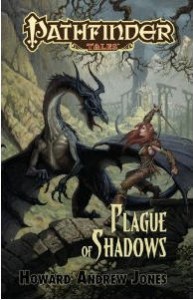 11) Pathfinder Tales by various–D&D tie-ins, really? I imagined characters stopping to roll the dice during attacks, and more silliness. I just couldn’t wrap my mind about it. What I never expected to find was good sword & sorcery/fantasy novels, but these are a real find. I have read four so far and enjoyed them thoroughly. This is some great stuff. Don’t let the tie-in stigma scare you off. Editor James L. Sutter is doing some great stuff with some great authors like Howard Andrew Jones and Dave Gross. If you enjoy fantasy and magic, even if you’re not into RPGs, you’ll love this. If you are into RPGs, that’s just a bonus.
11) Pathfinder Tales by various–D&D tie-ins, really? I imagined characters stopping to roll the dice during attacks, and more silliness. I just couldn’t wrap my mind about it. What I never expected to find was good sword & sorcery/fantasy novels, but these are a real find. I have read four so far and enjoyed them thoroughly. This is some great stuff. Don’t let the tie-in stigma scare you off. Editor James L. Sutter is doing some great stuff with some great authors like Howard Andrew Jones and Dave Gross. If you enjoy fantasy and magic, even if you’re not into RPGs, you’ll love this. If you are into RPGs, that’s just a bonus.
Okay, there’s eleven series I loved in spite of initial reservations. I’m sure I’ll discover more, but what about you? Please post yours in comments. I’m sure we’d all love to discover more!’ll be tearing back into this. Military culture is well handled, of course, but the alien invasion and character drama is fascinating too. He really is the Clancy/Griffin of SF writers. His tension and the intrigue level is far more than I’d anticipated. It really keeps you hooked and turning the pages. I really enjoyed these.
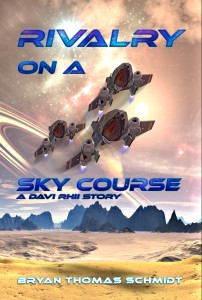 Bryan Thomas Schmidt is the author of the space opera novel The Worker Prince, a Barnes & Noble Best SF Releases of 2011 Honorable Mention, the collection The North Star Serial, Part 1, and has several short stories forthcoming in anthologies and magazines. His second novel, The Returning, is forthcoming from Diminished Media Group in 2012 along with the anthology Space Battles: Full Throttle Space Tales #6 which he edited for Flying Pen Press, headlined by Mike Rensick. As a freelance editor, he’s edited a novel for author Ellen C. Maze (Rabbit: Legacy), a historical book for Leon C. Metz (The Shooters, John Wesley Hardin, The Border), and is now editing Decipher Inc’s WARS tie-in books for Grail Quest Books. He’s also the host of Science Fiction and Fantasy Writer’s Chat every Wednesday at 9 pm EST on Twitter, where he interviews people like Mike Resnick, AC Crispin, Kevin J. Anderson and Kristine Kathryn Rusch. A frequent contributor to Adventures In SF Publishing, Grasping For The Wind and SF Signal, he can be found online as @BryanThomasS on Twitter or via his website. Excerpts from The Worker Prince can be found on his blog. Bryan is an affiliate member of the SFWA.
Bryan Thomas Schmidt is the author of the space opera novel The Worker Prince, a Barnes & Noble Best SF Releases of 2011 Honorable Mention, the collection The North Star Serial, Part 1, and has several short stories forthcoming in anthologies and magazines. His second novel, The Returning, is forthcoming from Diminished Media Group in 2012 along with the anthology Space Battles: Full Throttle Space Tales #6 which he edited for Flying Pen Press, headlined by Mike Rensick. As a freelance editor, he’s edited a novel for author Ellen C. Maze (Rabbit: Legacy), a historical book for Leon C. Metz (The Shooters, John Wesley Hardin, The Border), and is now editing Decipher Inc’s WARS tie-in books for Grail Quest Books. He’s also the host of Science Fiction and Fantasy Writer’s Chat every Wednesday at 9 pm EST on Twitter, where he interviews people like Mike Resnick, AC Crispin, Kevin J. Anderson and Kristine Kathryn Rusch. A frequent contributor to Adventures In SF Publishing, Grasping For The Wind and SF Signal, he can be found online as @BryanThomasS on Twitter or via his website. Excerpts from The Worker Prince can be found on his blog. Bryan is an affiliate member of the SFWA.

